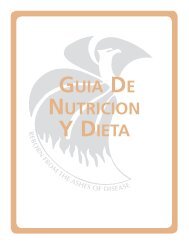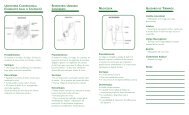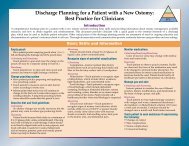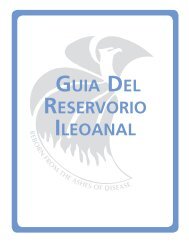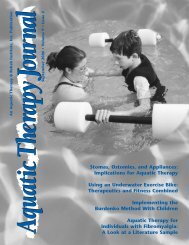Continent Diversion - United Ostomy Associations of America
Continent Diversion - United Ostomy Associations of America
Continent Diversion - United Ostomy Associations of America
You also want an ePaper? Increase the reach of your titles
YUMPU automatically turns print PDFs into web optimized ePapers that Google loves.
and those individuals have to catheterize through<br />
their urethras to empty their neobladders. The bladder<br />
cancer website, http://blcwebcafe.org, has several<br />
members with neobladders. Their experiences range<br />
from total continence to hypercontinence. They are a<br />
knowledgeable and excellent source for information<br />
and tips on dealing with neobladders.<br />
General Information<br />
Urostomates need to be aware that any symptoms <strong>of</strong><br />
kidney infection (chills, fever, fl ank pain, dehydration,<br />
unusual fatigue, change in the volume, color or odor<br />
<strong>of</strong> urinary output, or a change in the amount or color<br />
<strong>of</strong> mucus) require immediate medical attention. An<br />
infected kidney is not only excruciatingly painful, but<br />
may result in permanently impaired kidney function.<br />
Early oral antibiotic treatment may control a<br />
minor kidney infection. Urine cultures and blood<br />
tests help determine the specifi c bacteria involved,<br />
so the appropriate antibiotic can be given. If stronger,<br />
intravenous antibiotics are needed, this generally means<br />
a few days in the hospital as well as a few weeks for<br />
recovery. Extensive antibiotic therapy is not the solution<br />
to recurrent kidney infections and may result in a<br />
resistant strain <strong>of</strong> bacteria.<br />
Recurrent kidney infections warrant further<br />
examination, usually an IVP and/or loop-o-gram, or<br />
pouch-o-gram, to determine whether or not there is an<br />
obstruction or stricture that needs correction.<br />
Resources<br />
Check with the UOAA for names <strong>of</strong> ostomy nurses<br />
and for members with urostomies. Local UOAA<br />
support groups should have the names <strong>of</strong> nurses in their<br />
communities. National UOAA at 800-826-0826 can<br />
supply the name and number for all support groups.<br />
Finding an ET or wound, ostomy and continence<br />
nurse with good urinary diversion experience may take<br />
some effort. See the website www.wocn.org, click on<br />
services and resources, click on referrals, then click on<br />
consultant registry for a list <strong>of</strong> names.<br />
Another excellent place to fi nd support is through<br />
the WebCafe’s free email list/support group for bladder<br />
cancer warriors, see: http://blcwebcafe.org.<br />
Got guts? Gear up!<br />
JOIN THE RIDE FOR CROHN’S AND COLITIS<br />
Join Get Your Guts in Gear (GYGIG) for a 3-day experience that raises awareness and funds for people with<br />
Crohn’s disease, ulcerative colitis, or people who have had ostomy surgery. GYGIG’s 210-mile rides are fully<br />
supported, scenic, and designed to create an empowering community—gear up for an unforgettable adventure!<br />
To ride, crew, or volunteer, call 1.866.9iGOTGUTS (1.866.944.6848)<br />
or visit www.IBDride.org.<br />
June 12-14, 2009<br />
New York’s Hudson River Valley<br />
August 7-9, 2009<br />
Pacifi c Northwest/Seattle area<br />
October 2-4, 2009<br />
Midwest/northern Illinois and southern Wisconsin<br />
Benefi ting: Presented by: Nationally sponsored by:<br />
© 2009 Get Your Guts in Gear, Inc. All rights reserved.<br />
Advocacy for Patients<br />
with Chronic Illness, Inc.<br />
18 The Phoenix <strong>Continent</strong> <strong>Diversion</strong> New Patient Guide



